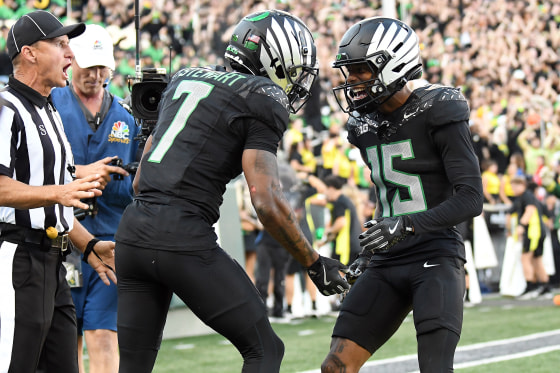In a recent custom at the University of Oregon, its fans spend the minutes between the third and fourth quarters singing “Shout,” an ode to “Animal House,” which was filmed on the Eugene, Oregon, campus.
They were shouting again Saturday. And by the end, that noise became screams.
Fans stormed the field inside Autzen Stadium after third-ranked Oregon outlasted second-ranked Ohio State, 32-31, the second time this college football season that a meeting of top-10 teams wasn’t decided until the final play.
Weeks after Alabama beat Georgia in an instant classic, the Ducks (6-0) remained unbeaten when Ohio State (5-1), given the ball for one last drive with 1:47 remaining in the fourth quarter, was pushed out of field goal range and saw its last play break down before Will Howard could even attempt a potential end zone heave.
The matchup was a sign of the current times in college football — a pair of veteran, transfer quarterbacks leading teams separated by nearly 2,500 miles, yet facing off in league play thanks to conference realignment.
And this is a matchup that could happen again in two months, thanks to the expansion of the College Football Playoff. After the first top-five matchup lived up to the hype, who’s up for a rematch in a few months?
Howard completed 28 of his 35 passes for 326 yards and two touchdowns. He dueled with Oregon quarterback Dillon Gabriel, who completed 23 of his 34 passes for 341 yards and also two touchdowns.
Until the final drive, the difference between teams was so small as to appear nonexistent.
Oregon finished with 14 more rushing yards and 15 more passing yards. Ohio State had the game’s only turnover. Ohio State led 7-6 after one quarter, Oregon 22-21 at halftime, and Ohio State 31-29 with 1:54 to play, as the Ducks faced third and goal, two yards from the end zone and the lead. That run barely gained a yard but led to a 19-yard field goal that pushed Oregon ahead, 32-31.
It would stand as the game-winning kick when Ohio State’s final drive ended after eight plays and 49 yards, stuck 38 yards from the end zone. Since these teams first met 66 years ago, Ohio State won the first nine matchups, but Oregon has claimed the last two.
In previous eras, Saturday would have effectively served as a knockout game for the loser’s chances of advancing to the College Football Playoff. That level of pressure on every weekend helped to fuel the sport’s popularity, while also differentiating it from the NFL.
But Saturday’s back-and-forth result was an example of why the expansion of the playoff this year — to 12 teams — could endure as a good thing. For exactly 60 minutes, both teams looked to be among the very best the country has seen this season. The expansion ensures both, and not only the winner, will have the opportunity to prove that in December, and potentially January, instead of penalizing one for a result on the second weekend in October.
And that just might be something worth shouting about.
